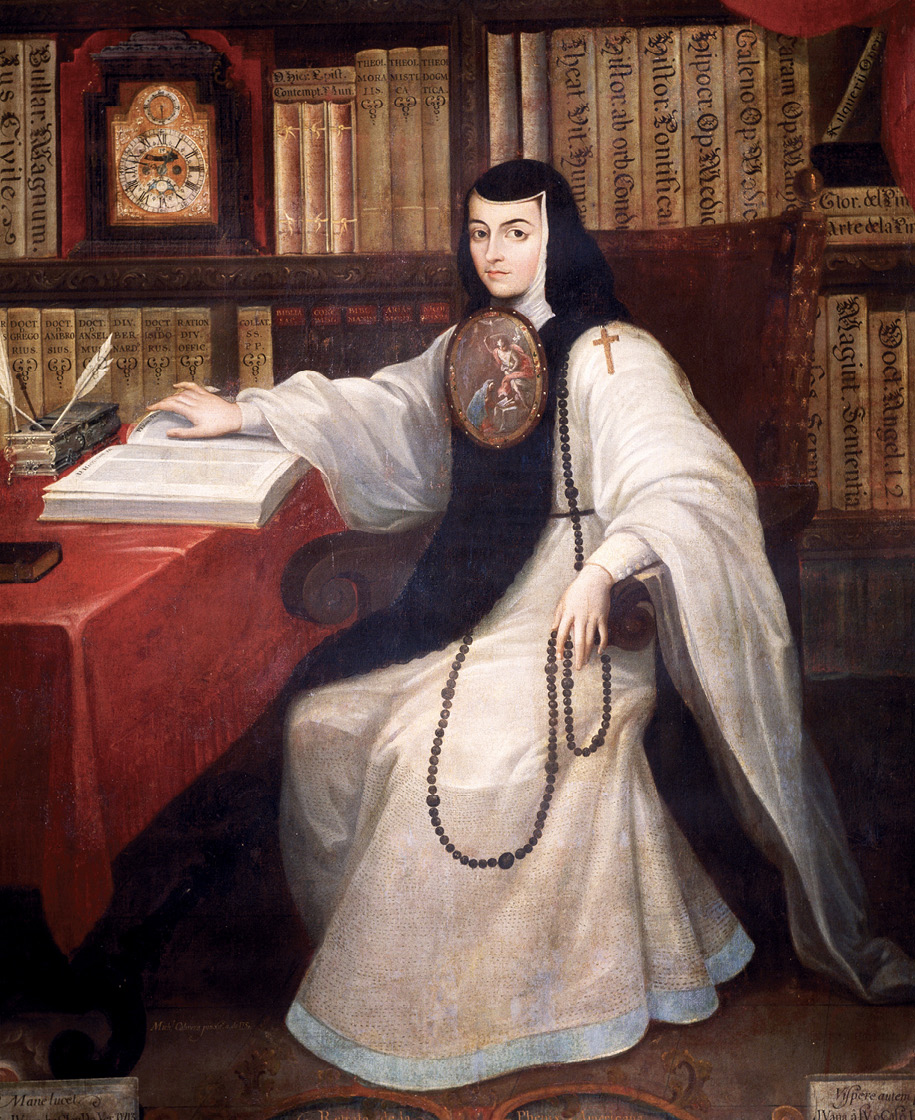Sor Juana Inés de la Cruz

Chelsea
When Juana Inés de Asbaje y Ramírez de Santillana, later known as Sor Juana Inés de la Cruz, was born in mid-seventeenth-century Mexico, at the time still part of Spain, educated girls were a rarity, even privileged ones like her. Still, as a girl, Juana was hungry for knowledge. She would hide in the chapel of her family’s estate to read as often as she could, borrowing books from her grandfather’s library next door; she would later claim to have read all the books he had.
While not much is known about Juana’s early life, we do know that she wrote a poem at eight and, around the same time, was sent to live in Mexico City with extended family. She left behind her mother, who continued living more than thirty miles away. We also know that Juana always dreamed of going to college. As university degrees would not be awarded to women in Mexico for more than two hundred years, Juana begged her family to let her enroll dressed as a man. They refused.
“Yo no studio para saber más, sino para ignorer menos.”
“I don’t study to know more, but to ignore less.”
—SOR JUANA INÉS DE LA CRUZ
When she was thirteen, Juana entered into service as a lady-in-waiting to the wife of the viceroy of New Spain. Juana’s intelligence was unmistakable, and a year after she had joined the viceroy’s court, a series of scholars tested her on questions of literature, history, math, and more. Juana so impressed them that she and her intellect became well known throughout Mexico.
Wanting to further her studies, and not wanting to get married, Juana took the only path available to her: She became a nun and joined the Convent of the Order of Saint Jerome. She seemed to struggle with the idea of blind faith, writing, “Can I not be saved while learning? Why would salvation need to come through the path of ignorance if that is repugnant to my nature?” In the end, she decided religious education was “the least disproportionate and most honorable decision I could make.” In the convent, Sor Juana had a study and library of her own, and time to read, write poetry and plays, and talk with other scholars (all men) at the nearby university. She wrote essays, plays, and passionate love poems to María Luisa, the wife of the new viceroy. “Loving you is a crime,” she wrote, “for which I never shall atone.”
Like so many other outspoken women throughout history, she attracted her share of detractors. In 1690, more than twenty years after she entered the convent, Sor Juana wrote a letter criticizing a recent Jesuit sermon. The letter was published without her permission by a high-ranking bishop, and Sor Juana was criticized both for the letter’s contents and for focusing on nonreligious themes in her poetry. She responded to the furor with her now-famous “Respuesta a Sor Filotea de la Cruz” (“Reply to Sister Filotea of the Cross”), which is recognized today as the first articulation of a woman’s right to education in the Americas.
Although she endured intense backlash for “Respuesta” and various priests demanded that she renounce her work and studies, Sor Juana continued writing. In her poem Hombres Necios (Foolish Men), Sor Juana responded, line by line, to the impossible double standards to which men hold women. (“You think highly of no woman,” she wrote, “no matter how modest: if she / rejects you she is ungrateful, / and if she accepts, unchaste.”) And in her poem “Primero Sueño” (“First Dream”), she described the soul’s quest for knowledge, making clear that it’s not only men whose souls thirst to understand more. As a nun, she also scandalized audiences with her lyric poems celebrating physical beauty: “I shall not play the slenderness / Of your fine, exquisite torso / For the bend of your waist is as / Troubling as a trill in the song.”
Throughout her life, Sor Juana defied expectations. In her forties, she sold the four thousand books she owned, as well as her musical instruments, and donated the proceeds to charity. In 1695, while taking care of fellow nuns who were sick with the plague, Sor Juana fell ill and died.
In “Respuesta,” she wrote that “God has given me the gift of a very profound love of truth.” That love of truth and knowledge was a dangerous trait for a woman in the 1600s. Sor Juana was hundreds of years ahead of her time, something she may well have known then. Her extraordinary life has been the subject of multiple books, plays, and films, and people in Mexico see her face every day on the two-hundred-peso note, a constant reminder of a woman who believed her intelligence was something to be cultivated, valued, and admired—never downplayed or apologized for.